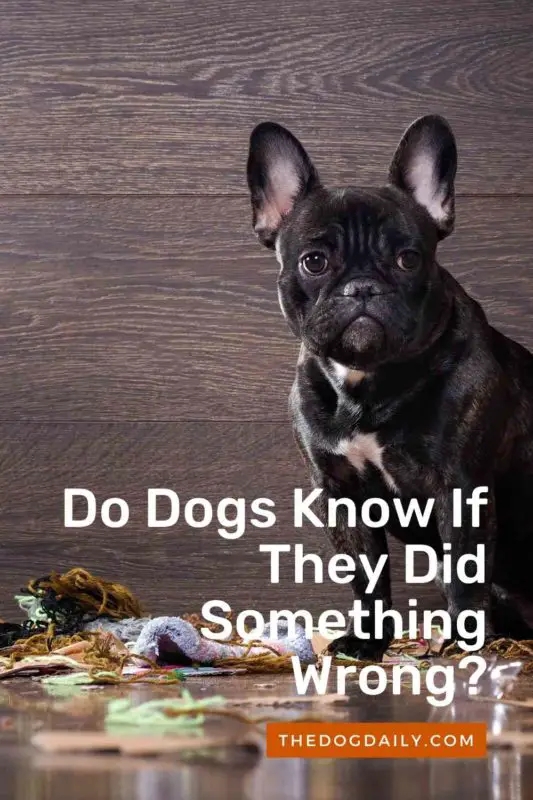Do Dogs Know When They Are Wrong?
When a technician comes to my house, my next-door neighbor’s friendly yet hyper dog often dashes outside. Goober jumps on the startled individual in the middle of the street. I also jumped the first few times the large dog leaped on me. But a stern “No!” and “Sit!” calms him down and leads to “the look.” Does that look mean that dogs know they’ve done something wrong?
You’re probably familiar with this look. It’s the “I’m so sorry, please don’t be mad at me” face, which can melt even the hardest of hearts. Two-year-old children seem to have it mastered. “He knows he’s done something wrong! He looks guilty!” How many times have you heard someone say that? You may have said it yourself. Your dog’s expression is familiar: crouched low, tail between the legs, eyes averted and licking nervously.
Maybe he’s moving slowly away from you with a fearful look.
Do Dogs Feel Guilt?
He’s not feeling guilty, and he’s not acting guilty either; he is acting submissive because you’re angry. As you know, dogs are descendants of wolves. When the lead wolf in a pack (called the alpha) gets mad at another wolf, the lower wolf becomes submissive. The more subordinate wolf averts his gaze, crouches, and licks nervously. The alpha growls until he’s satisfied that the pack member is submissive enough.
When you growl (yell, punish, etc.), you’ve become that alpha. Hence, the submissive behavior toward you. Although I don’t advise it, you can also elicit the same response by pointing your finger at your dog and telling him he’s a bad dog.
Do Dogs Remember Punishment?
Dogs don’t feel guilty, but they do react submissively to your anger. They don’t think about right or wrong, good or bad. They do think about whether or not the leader is angry. Sometimes they even anticipate your anger based on your body language or your usual patterns of behavior. For example, if you yell at your dog when you come home for his occasional lapses in behavior, he will assume that you will yell at him every time you come home. He associates the yelling with you coming back, not with anything that he did.
Study Examines Dogs That Behave and Disobey
Canine expert Alexandra Horowitz recently conducted an extensive study on what we perceive as dog guilt. The Barnard College Assistant Professor gathered dog owners and their pets, and she asked the owners to leave the room after ordering their dogs not to eat a yummy treat. While the owners were out, Dr. Horowitz gave individual dogs the treats before the owners returned. During some trials, she told the owners that their dog had eaten the forbidden treats, even if they had not and had behaved.
Owners told that their dogs had misbehaved, even if that wasn’t the case, reported that their dogs looked guilty. These dogs were said to look more guilty than dogs with their fill of treats, especially when owners admonished the innocent dogs. The study, published in the journal Behavioral Processes, could be interpreted as suggesting dog guilt is all in our minds, but Dr. Horowitz disagrees.
“Based on the experiment, ‘the look’ that we, humans, believe indicates their disobedience did not prompt dogs’ guilt,” says Dr. Horowitz. “Instead, it appeared most when they were scolded or about to be scolded.”
Do Dogs Know If They Did Something Wrong?
Guilt requires more complex thought than merely realizing that some behavior is forbidden, harmful, or wrong. Dr. Horowitz thinks that feeling guilt involves understanding a moral code of conduct, which one is conscious of violating and realizes that others are aware of the violation. That requires more complicated mental processing than learning that certain behaviors are punishable or may lead to undesired consequences.
“Dogs learn that they can show the ‘guilty look’ when we approach them with a particular posture or tone of voice. They know it may lead to a scolding because it has in the past,” says Dr. Horowitz.
So dogs may not know that they have done something wrong, but they know if you are upset with them.
Discouraging Unwanted Dog Behaviors
Guilty face or not, since dogs understand the connection between punishment and particular actions, Dr. Horowitz offers the following advice:
- If possible, ignore your dog when it first misbehaves. Getting your attention, even if you are angry, can be an award for your dog. The same holds for individual children who sometimes act out just to become the center of attention.
- Try to avoid the situation that leads to misbehavior.
- Most important, praise your dog when it performs desired behaviors. Your pet will remember positive feedback and be more inclined to do “good” in the future.
Theory of Mind in Dogs
Central to guilt is something called the “theory of mind.” It’s the ability to attribute
mental states, such as beliefs or intentions, to oneself and others. Dr. Horowitz believes dogs may possess a rudimentary theory of mind. She says dogs seemed to be attentive to other dogs’ attention during studies, not merely which way the dogs were looking but also whether they were distracted in play, gazing blankly into the distance, or ready to play.
Dr. Horowitz cautions against anthropomorphizing dogs or attributing human looks and characteristics to them. She concludes, “The best tactic is always first to step back and look at what the dog is doing, without imagining them as little furry people.”
Article written by Author: Margaret Bonham, and The Dog Daily Expert

